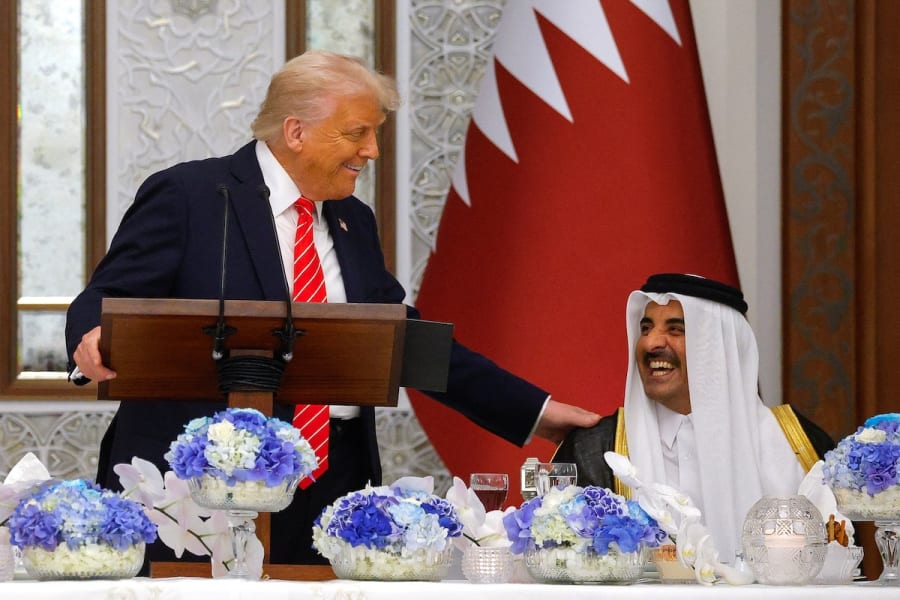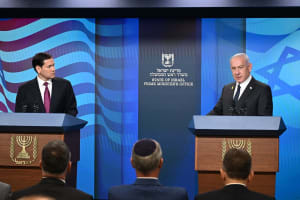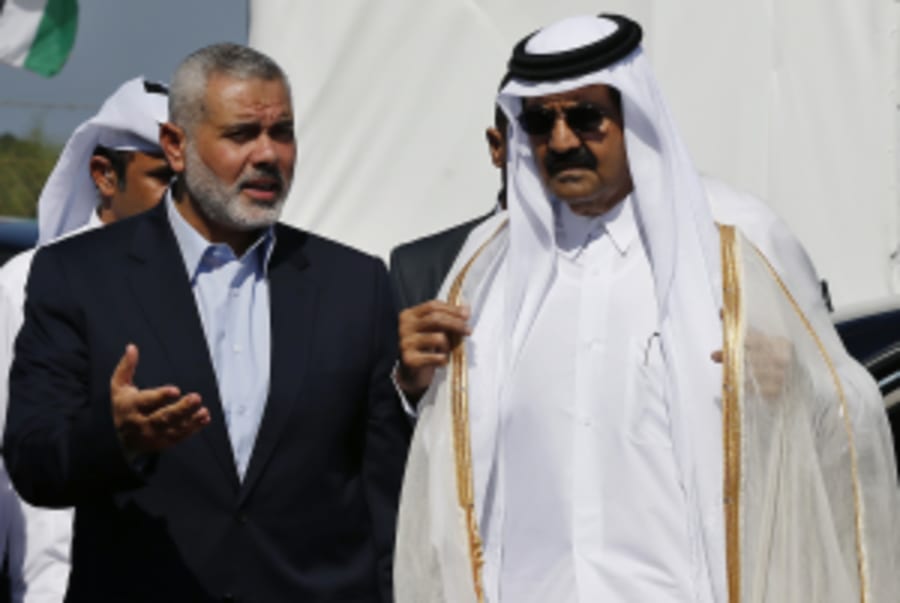Why does Washington keep shielding terror's banker?

The West knows Qatar harbors terror leaders and bankrolls extremist groups.
According to Dr. Udi Levy, former head of the Mossad's Economic Warfare Division, newly uncovered documents in Gaza reveal just how deeply Qatar deceived the world for years.
So why, despite these revelations, does the United States – a country that insists it is cracking down on terror infrastructure and fundraising – continue to pander to the Islamic state?
The answer lies in a dangerous blend of money, power, and political convenience. Qatar has leveraged its wealth to buy influence across the West and entrenched itself as indispensable to U.S. military strategy in the Middle East. The result is a paradox: Washington condemns terror while cozying up to one of its most notorious sponsors.
On September 9, Israel launched an airstrike in Doha targeting some of the last remaining Hamas leaders. While the final results of the strike remain unclear, Prime Minister Benjamin Netanyahu declared it a success, saying it sent a message to these terrorists that they can run but they cannot hide from Israel. He vowed the country would find and eliminate them wherever they are.
Immediately after the incident, however, U.S. President Donald Trump and Secretary of State Marco Rubio struck a more complicated tone. Although both confirmed multiple times that Hamas must be eliminated and praised the strike against its leadership, they simultaneously appeared to appease Qatar. Trump dined with Qatari Prime Minister Mohamed bin Al-Thani, while Rubio made a special stop in Doha on his way out of Israel.
So what drives America to keep lying in bed with terror supporters? The answer, in large part, comes down to money and military power.
Qatar has gained influence across the West, acquiring real estate, sports teams, investment funds, and even key infrastructure. It also hosts America's most extensive military base in the Middle East.
"The administration is under phenomenal pressure from the Pentagon, which has invested an enormous amount of time, money and resources in this base," Rabbi Pini Dunner, a leading American voice exposing Qatar's influence and funding of Hamas, explained to ALL ISRAEL NEWS. "The U.S. established CentCom at the Al Udeid Air Base in Qatar, rightly or wrongly, but that is where it is, and it is not something they can just walk away from overnight."
While it would technically be possible to move the base – perhaps even to Gaza once the war is over, which could offer the U.S. a new and strategic launching point – such a shift would take time.
Meanwhile, Qatar's influence reaches far beyond the battlefield.
Speaking at the International Institute for Counterterrorism Annual Conference at Reichman University this week, Levy warned that "Qatar has succeeded … in conquering the West, including the State of Israel." He explained that "conquest does not necessarily mean taking over territory; conquest is also the ability to paralyze your enemy's decision-making processes. And this is exactly what Qatar is succeeding in doing."
According to Levy, Qatar has acquired assets not only in the West and Israel but also across Africa and South America, thanks to a combination of "ingenuity" and "significant assistance from various Jewish and Israeli actors from different spheres, including campaigners, lobbyists, hi-tech, security, financial advisors, and those whispering into the ears of decision-makers.”
"It's the epitome of modern Machiavellianism," said Ruth Wasserman Lande, a former Knesset member who co-chaired the Abraham Accords Caucus. She told ALL ISRAEL NEWS that Qatar "very systematically, patiently, and meticulously over the last two decades, has been planning the infiltration of Islamic ideology into the West."
She explained that this strategy went far beyond business deals. Qatar embedded its people into school boards and city councils, shaping the education system so that, in some schools, curricula included ideas contrary to U.S. and Western values – from Marxism to religious extremism.
"In the UK elementary schools, they have kids learning about the Muslim faith," Wasserman Lande stressed. "There are more than 60 million people in the UK, whereas there are about 3.5 million Muslims. It's not a minority in numbers that should have such an impact. But you have Qatar owning more assets in the UK than the king.”
While that may be an exaggeration, the Qatari royal family owns billions of pounds worth of real estate across London.
“You also have a minister of education who is an Islamist in the United Kingdom, and you have a minister of internal security, a woman who is an Islamist,” Wasserman Lande added. “Those are the people that control the police, the secret service, education, and the minds of the next generation."
At the same time, some experts believe America is slowly beginning to recognize the danger.
Since taking office, Trump has designated several international NGOs as "foreign terrorist organizations," allowing people who support them to be criminally charged. In many cases, these NGOs were arms of the Muslim Brotherhood, now exposed by U.S. intelligence services.
But it goes beyond that, explained Dunner. Qatar has clearly received the message. While Trump is not about to walk away from Qatar, and despite his statement that he would not allow Israel to strike inside the country again, it is also clear the president will likely not stop Israel from acting if Hamas leaders resurface.
According to Dunner, Qatar knows that no matter what Trump said after the attack, he ultimately gave Israel the green light.
"I certainly think that they've changed dramatically and that Qatar is aware of it," Dunner said. "It's why Qatar tried earlier this year to bribe President Trump with the [$400 million Air Force One] plane. It's why they were willing to put on this huge reception for him and, even though if you watch Al Jazeera, the Arabic channel, they speak openly against Trump … Qatar was definitely making a play of placating him and trying to keep him on its side."
Wasserman Lande added that the shift is evident if one reads between the lines.
Rubio, she said, repeated over and over during his visit to Jerusalem that Hamas must be eliminated. They placate Qatar, she explained, "because there are many not-so-great role players in the world, and you still sort of have to play the game."
The question, she said, is for how long and to what extent.
Wasserman Lande argued that the key is reframing the language used about Qatar by not focusing only on antisemitism and anti-Zionism, but on its broader threat to the West. Otherwise, she warned, the U.S. risks following Europe, Canada, and Australia, where protests are no longer just about "Free Palestine" but also about being "Down with France" or "Down with the Sydney Harbour Bridge."
"They are killing and infiltrating the West," Wasserman Lande said.
Dunner predicted that the impact of October 7 and the war against Hamas on Qatar will unfold over the next few years of Trump's presidency. No matter how much money Qatar spends lobbying Capitol Hill, the damage is done.
"Slowly but surely, the air is beginning to seep out of the balloon," he concluded.
.jpg)
Maayan Hoffman is a veteran American-Israeli journalist. She is the Executive Editor of ILTV News and formerly served as News Editor and Deputy CEO of The Jerusalem Post, where she launched the paper’s Christian World portal. She is also a correspondent for The Media Line and host of the Hadassah on Call podcast.
You might also like to read this:

















